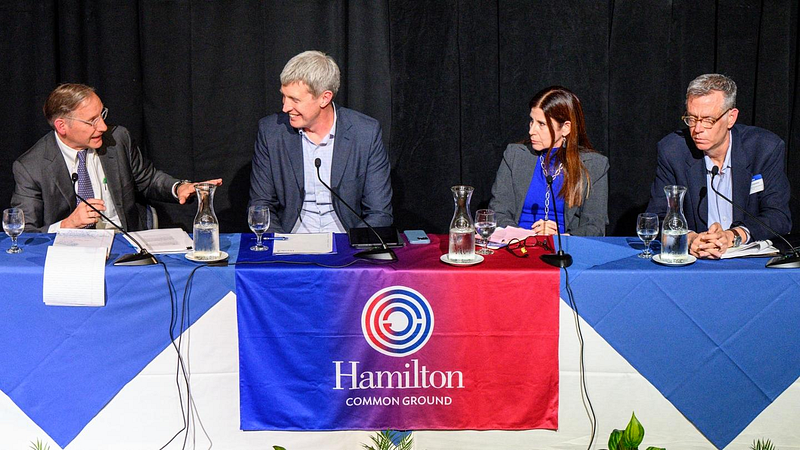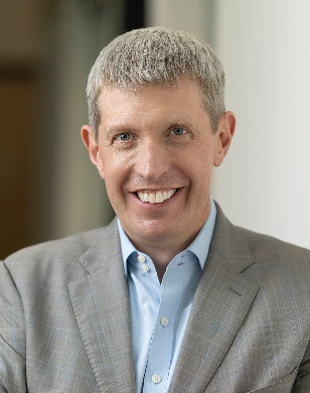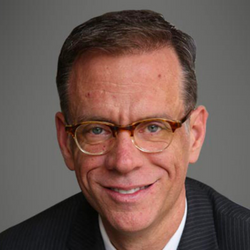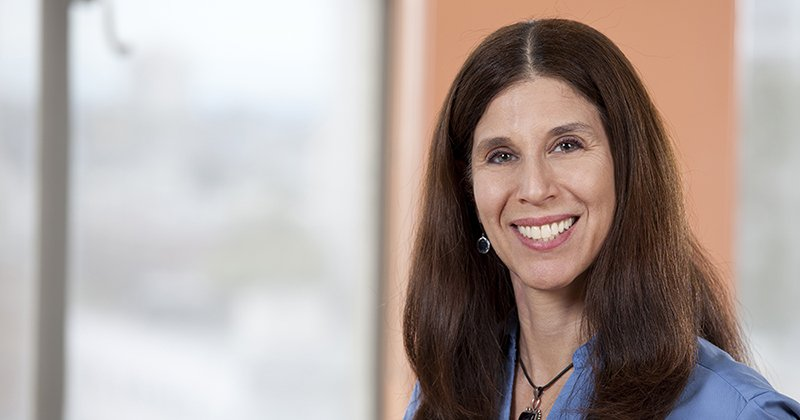
303 Creative LLC v. Elenis
. Photo by Nancy L. Ford, courtesy of Hamilton College.
Hamilton College hosted its second Common Ground event of the semester on Wednesday Oct. 18. Located in the Fillius Events Barn, the event invited three panelists — Eric Olson, Hila Keren and Dale Carpenter — alongside moderator Michael J. Grygiel ’79, P’23, to discuss the recent Supreme Court case
303 Creative LLC v. Elenis
, which attempts to answer questions regarding free speech.
303 Creative LLC v. Elenis
, a case decided in 2023, includes petitioner Lorie Smith, a wedding website designer based out of Colorado, who requested a pre-enforcement challenge before she posted a note on her website that claimed she would not provide services to queer couples. Ultimately, the case concluded in a 6–3 decision in favor of 303 Creative LLC.
Olson acted as lead counsel in the case representing the state of Colorado; Keren is the Associate Dean and a professor at Southwestern Law School and highlighted many concepts relevant to
303 Creative
in her article “Separating Church and Market.” Carpenter, coming from SMU Dedman School of Law as the Judge Hawley Atwell Chair of Constitutional Law, Altshuler Distinguished Teaching Professor and Professor of Law, is the a co-author of an amicus brief submitted in
303 Creative
; and Grygiel is a lawyer with specialities in media and the First Amendment who helped bring the event to Hamilton.
Kaity Stewart, Assistant Director of Common Ground, told
The Spectator
, “Mike had a professional connection to Eric Olson, who argued the
303 Creative
case on behalf of Colorado in the District Court and was able to build the panel from there. We strive to create events that are timely and integrate current events that matter to our community and felt like this case fits that role.”
The event began with an introduction of Grygiel by Ty Seidule, Visiting Professor of History and Executive Director of Common Ground at Hamilton, and then an introduction of the panelists. The panel included an explanation of a case of precedent to
303 Creative
,
Masterpiece Cakeshop
,
Ltd. v. Colorado Civil Rights Commission
(2015), and the Colorado Anti-Discrimination Act (CADA) that played a key role in the litigation and argumentation of both cases.
Within the first ten minutes of the panel, a sign was dropped from the higher level of the Events Barn, which read “My Rights Are Not Up For Debate.” Keren took the opportunity to acknowledge this demonstration, telling the audience: “I am here to protect the rights tonight…that’s part of free speech and I commend the use of free speech in this kind of a way.”

Stewart told
The Spectator
, “Before the event started, some students and organizations we reached out to had expressed concern that the panel would not be representative of LGBTQ+ people and that some panelists might argue that LGBTQ+ rights do not matter. I think the event challenged those perceptions by demonstrating the panel was inclusive of LGBTQ+ identifying people and allies, and even those who argued in defense of free expression and speech also defended that LGBTQ+ rights matter.”
One key component of the event was the idea of free speech as not only a question of being free to speak one’s mind, but also free to not be compelled to speak either.
Similarly, Carpenter argued that without enforcing freedom of speech in this case, a risk is posed for other examples of exercising the First Amendment to be taken away, such as the right for libraries to carry particular books or for drag shows to take place. Through this lens, Carpenter highlighted the ways in which freedom of speech applies even to ideas and circumstances that appear to inherently oppose each other.
However, under CADA, as vendors in the public marketplace and public accommodations, businesses are compelled to serve everyone, regardless of sexual orientation. In this way, 303 Creative challenges the intersection between the First Amendment and CADA.

On this line, part of the debate focused on specific scenarios that could take place regarding Smith’s website, including if a queer couple asked for the same website as a heterosexual couple, with only the names changed. Examples like these allowed the panelists to reflect on the limits of speech compulsion and the importance of the element of customization to the case.
After the panelists concluded their talk, the conversation opened to the audience for questions, which included several students taking part. One individual asked about the judicial considerations of a cases’ merits versus its potential impact on the country, and how the duality was considered when rendering a decision. Another individual asked a clarifying question regarding a “statute” Carpenter had mentioned earlier in the panel.
Prior to the event, which began at 7:30 p.m., Common Ground hosted their traditional Cookies & Coffee with the panelists earlier in the afternoon, as well as dinner with the panelists, guests, and Common Ground’s Student Assistants. Sarafina Madden ’26 told
The Spectator
, “[Cookies & Coffee] was a great chance to talk to the speakers one-on-one and hear a little bit about what brought them to Hamilton and their various legal practices and their experience in law and what they were bringing to the conversation.”

After the Common Ground discussion, Carpenter posted a reflection on the event to
Reason
, where he wrote that the event was “more substantive than most panels I’ve participated in, even at law schools…I was amazed at the level of sophistication and engagement of the students at Hamilton College. The perceptiveness of their questions was remarkable…What’s more, a large group of students stuck around for even more thoughtful discussion off-camera for about an hour — until we were expelled by maintenance personnel. I’ve rarely encountered
law
students at one of these kinds of events as genuinely curious and open to new ideas as these undergraduates were. Bravo to Hamilton for whatever it is doing to select students and fuel their intellectual fires.”

Keren sent an email expressing gratitude for the Common Ground Experience. She wrote,
“Dear Kaity and Mike,
I wanted to express my endless gratitude.
Thank you for inviting me to Hamilton, exposing me to your impressive students, hosting me with warmth and generosity, and fostering a new generation of involved and informed citizens.
I would say more, but one of your students said it better in a personal thank you note he just sent me. He wrote:
“
If chatting with you over dinner was the first highlight of my day, seeing you speak was the second…Seeing you defend your beliefs and opinions in a respectful, intelligent and communicative manner using facts was amazing. I have never seen a discussion like that before, so impassioned and factual. Thank you so much for that — it’s shown me that discussions like that are possible in this increasingly polarized world and truly makes me believe in the mission of Common Ground.
”
Those interested in watching the panel can find a recording on the Hamilton College YouTube channel.
















